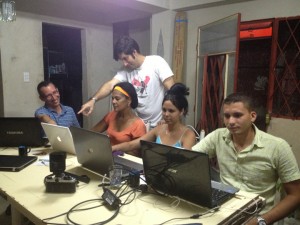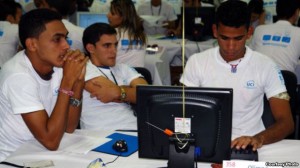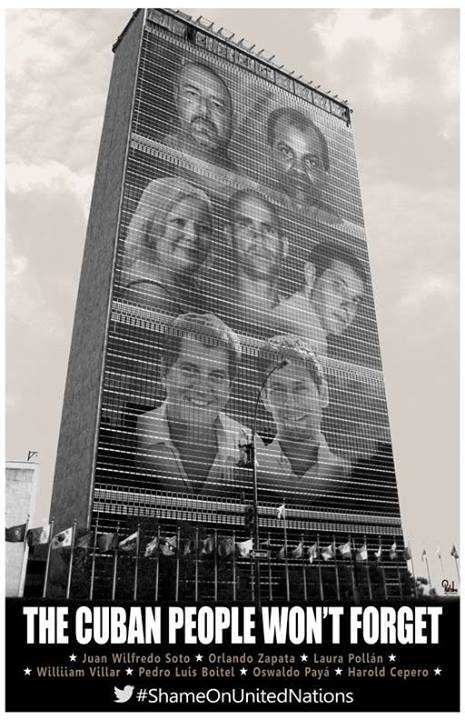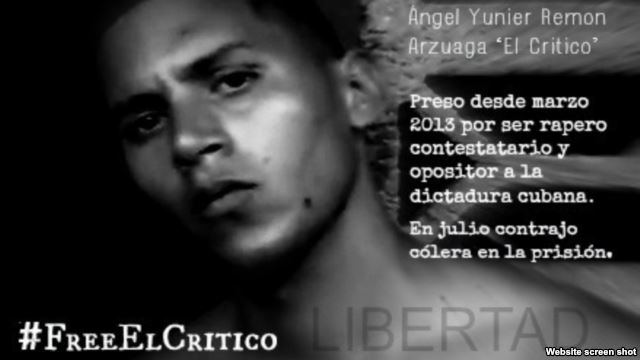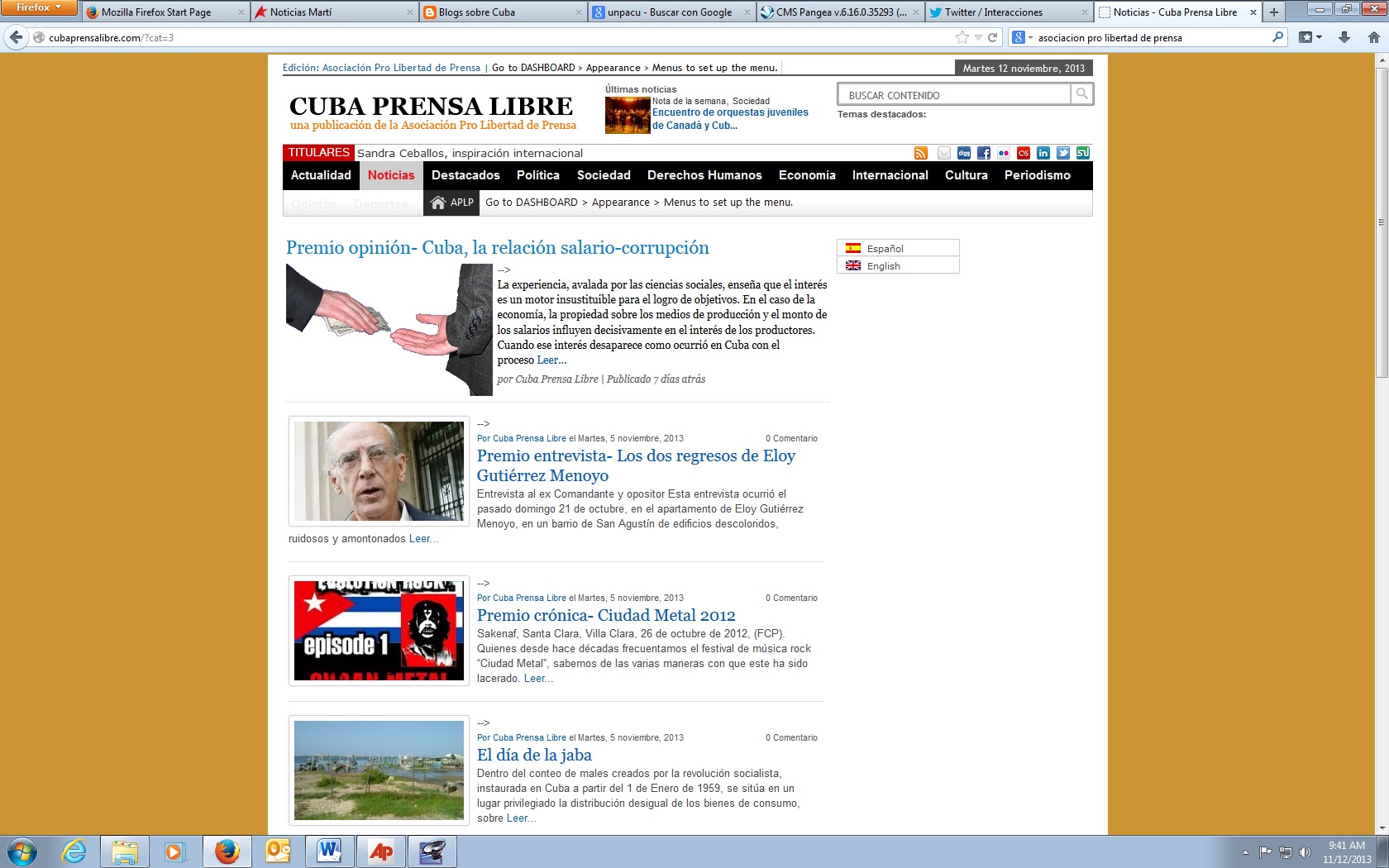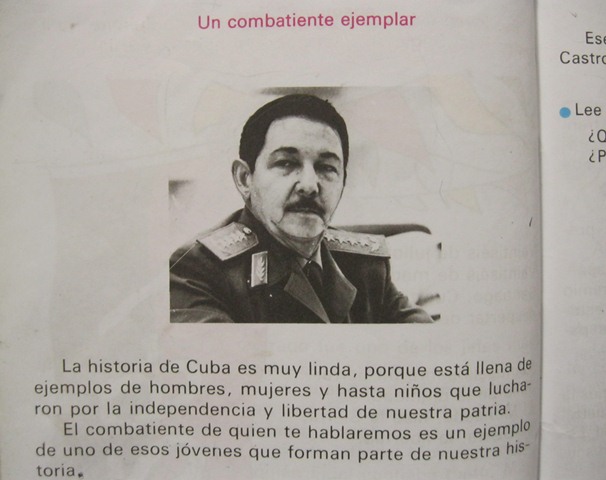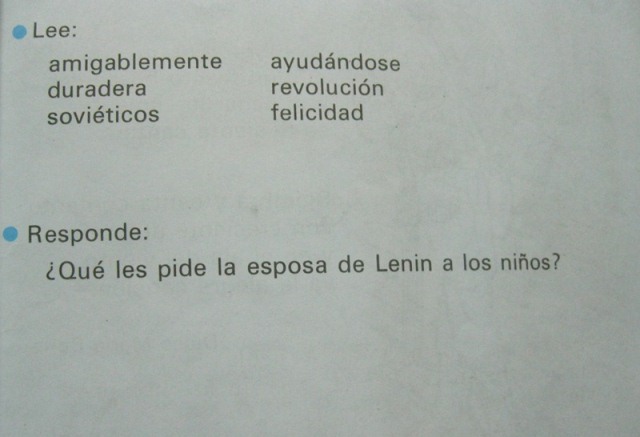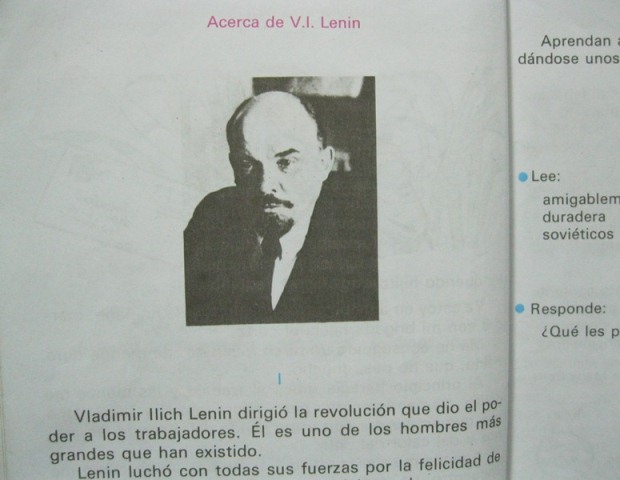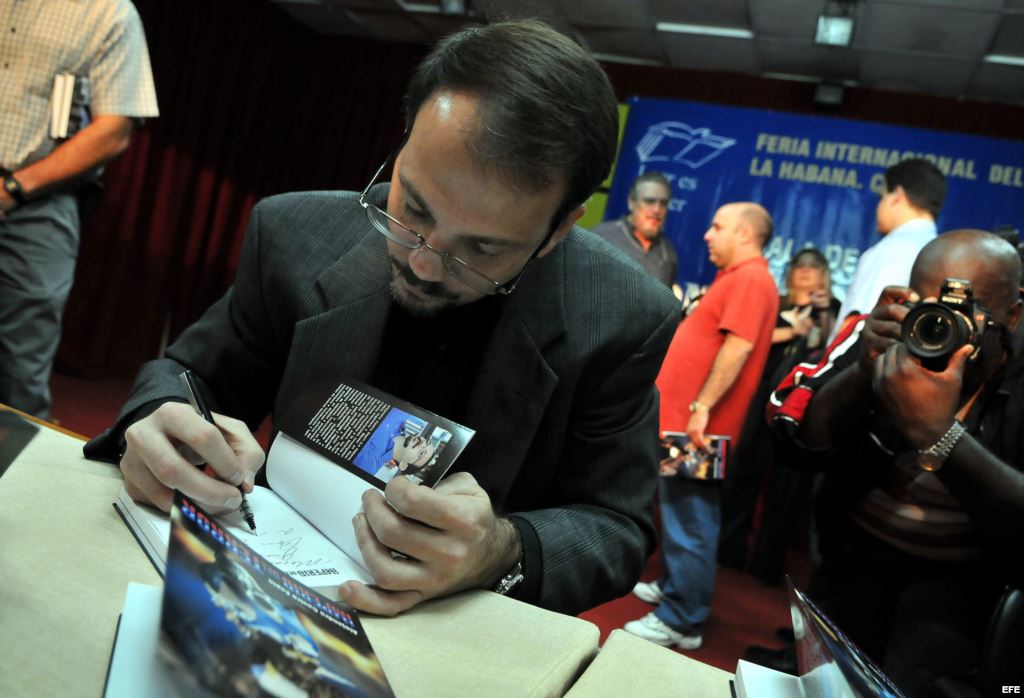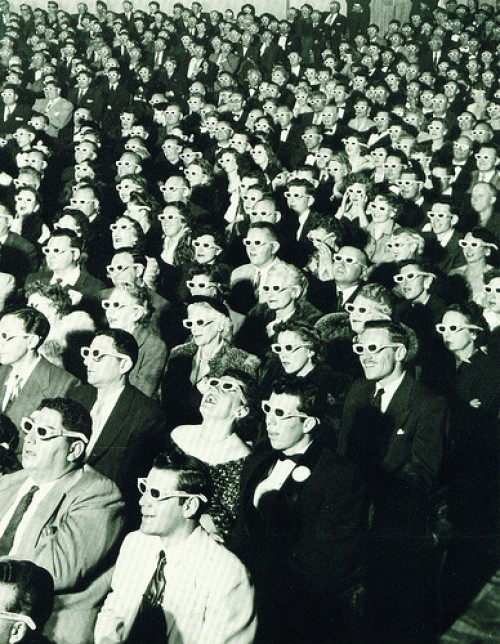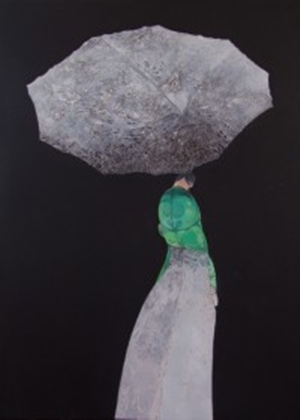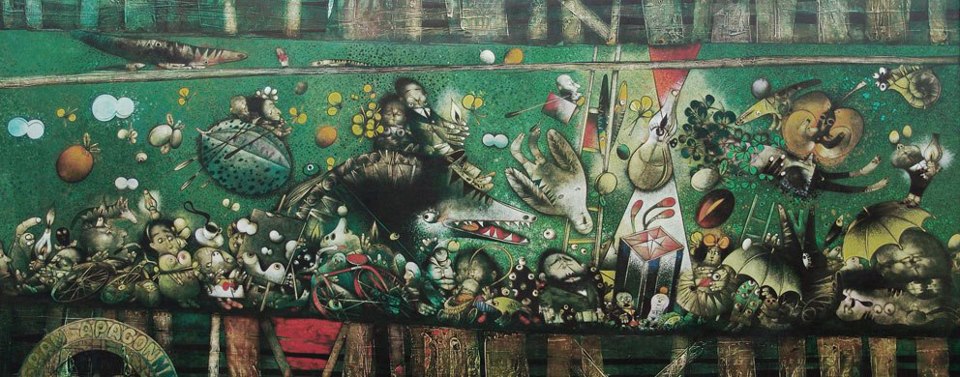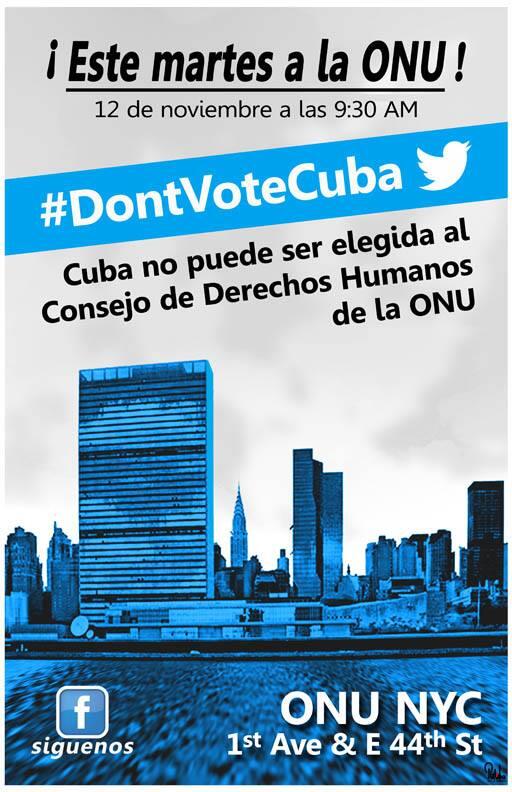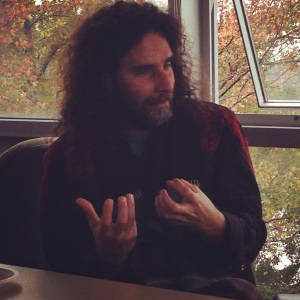
By Christine Moukazis
To Castro loyalists, Orlando Luis Pardo Lazo is considered many things: a clown, a worm, a counterrevolutionary and a cyber mercenary. But to hopefuls that would like to one day see Cuba take strides toward democratization, Lazo is a hero. In his writing, he serves as a loudspeaker broadcasting the concerns and private whispers of Cuban citizens afraid to exercise their own voices. Through his photography, Lazo is a conduit for Cuban exiles, looking for images to placate nostalgic yearnings for their lost country.
“When I don’t have to speak of something that happened to me, but rather somebody else, I feel more courageous,” Lazo said. “It’s like saying they can do whatever they want to me. I am talking about something that happened that is important to me…to help this person. And in that feeling of helping, I get gratification.”
The 41 year-old dissident –in opposition to official policy- blogger, with brown hair as unruly as his political disobedience, is the founder and editor of Cuba’s first digital magazine, Voces.
He is currently residing in Queens, N.Y. on a temporary academic exchange visa. This trip marks his first ever stay in the United States and is also the first time he has ever been separated from his mother, whom he lives with back home in Cuba.
Although the separation has been difficult for Lazo’s 78 year-old mother, she has conveyed, over the phone, that she is actually happy that he is currently away from Cuba. Last month, a political police officer in Havana was seen and heard on Lazo’s block, asking questions about the dissident blogger. The police officer was investigating into Lazo’s current visa status to make sure he was not seeking political refuge in the United States.
Lazo’s mother is terrified of the path her son has chosen, in opposing the Castro regime. When raising Lazo, his parents were always mindful of protecting their son from political influences.
Although he was a child in Cuba during the 1970s, in what he calls “the hardest period of ideology in my country,” Lazo recalls his childhood as one filled with happiness and surrounded by lots of light.
“I didn’t have the impression that my country was an oppressive country,” Lazo said. “Maybe as a boy, I was only part of the iconography. The flags. The heroes. I could not speak evil of José Martí or Fidel Castro. Fidel Castro was God. It was eternal. It was going to be Fidel forever and for me that was normal. It was national logic. You do not interfere with that.”
However, the government started to interfere with Lazo’s life plans. He had earned a degree in biochemistry at the University of Havana. As a biochemist, Lazo had the expectation of traveling outside of Cuba. Many of his friends were already traveling abroad to further their research. But the Center of Genetic Engineering and Biotechnology revoked the possibility of traveling outside of Cuba because researchers were not returning to their homeland. Lazo’s colleagues were applying to doctorate programs in the countries where they were conducting research and remaining there. As a solution to this problem, this special privilege was rescinded.
Feelings of hopelessness started to take over. In addition, to losing traveling privileges, Lazo’s institution did not have distilled water. Yes, they were biochemists without distilled water. Havana University was in ruins.
“Oh my God, is this my career?” Lazo would ask himself. “The adventure of this career and progressing were gone.”
By 1999, Lazo was no longer a biochemist.
He had been a writer since high school and always told himself that if he could not make it to the top in biochemistry, he would explore opportunities that involved writing.
Dr. Ted Henken, the president of the Association for Study of the Cuban Economy, admires Lazo’s approach to writing.
“Orlando Luis is a brilliant, irreverent wordsmith who loves to give his words new and surprising meanings and connotations by creating provocative hybrid words or phrases such ‘newrrative’ or ‘Revolution Evening Post’,” said Henken. “He is also a passionate and eloquent cyber-activist who enjoys debunking the often facile myths that ill-informed outsiders hold dear about the Cuban revolution.”
Lazo did not start publishing his dissident views of the Cuban government until 2008. He said there was no real breaking point, causing him to suddenly make his adversarial criticisms of the Castro regime public knowledge. It was just “Okay, I will publish this.” The decision was as simple as that. Lazo felt there would be no consequences to this public denouncement of the government. He describes the decision as a feeling of impunity. He was untouchable in his own eyes. In Cuba, there was little access to the Internet, so who was going to notice? He had no idea that feedback could be so fast and the Cuban government would be so quick to censor him.
In February 2009, Lazo had a book deal that was compromised by the Cuban government. His book, “Boring Home”, was all set to print when the government hijacked the entire operation and halted all manufacturing of the book. At this point, Lazo was already considered a dissident because of his close relations with Yoani Sánchez, a world-renowned Cuban blogger and dissident.
As provocation after an injustice by the Castro regime, Lazo announced that he would publicly make an independent demonstration of his book amidst all other official book presentations at the Havana Book Fair.
A government response to Lazo’s announcement was immediate. The political police started calling his home warning the dissident not to proceed with the book demonstration. Anonymous calls were made to Lazo’s mother threatening her. Lazo also received more than 100 anonymous cautionary emails.
As a precaution, Lazo invited the international press to the book fair. Under the close eye of the foreign press, the state was forced to acquiesce to Lazo’s presentation of “Boring Home”. However, a week later, he received a citation from the government calling him in for an interview, which he would later learn was really an interrogation.
From 3 p.m. to 8 p.m., Lazo was subject to questioning by the political police. He received vitriolic threats of rape by the officer, whose name was Adiel.
“If you threaten me with that, I should go to the street and put a bomb and try to topple the system, ”Lazo said. “The government is trying to radicalize you all the time because they cannot cope with civil behavior or civil resistance. They want you to throw a punch.”
Lazo made a declaration to the officer that his interview was now over. His friends had been protesting outside of the police station and Sánchez was on her way, so the police decided to release the dissident from their custody.
From that point on, Lazo would remain a constant target for the political police.
On November 6, 2009, the blogger was en route to a nonviolent march to protest brutality against dissidents in Havana when, ironically, men dressed in civilian clothing forced Lazo, along with the two women writers accompanying him, into a vehicle with yellow-colored private license plates. The three of them were beaten. Lazo recalls his face being pushed against the floor of the car.
“I was really worried about it because my feeling was they were taking us to a place they didn’t want us to see,” Lazo admitted. “And for me, this was a scene completely from movies, not from real life.”
As it turns out, the kidnapping was a precautionary measure taken by the government to remove the three dissident bloggers from the scene of the ongoing protests. If they were not present, stories could not be made and pictures could not be taken.
Lazo would later be arrested two more times, as precautionary measures. One could infer that the state is intimidated by his exercise of freedom of speech, despite totalitarian policies.
Dissidents are treated as outcasts in Cuban society. As a result, Lazo has lost numerous friends to his adversarial political beliefs. Some of them have gone as far as to publicly denounce him. Former friends would accuse him of improper behavior.
“Well, maybe I am a bad boy, but you are not the police,” Lazo asserts. “You can be my friend. You will not be contaminated. In Cuba, that’s the problem. You will be contaminated. Going to Yoani Sánchez’s place and publishing in my magazine, Voces, will contaminate you.”
Lazo’s remaining friends are supportive and confident in his social activist efforts. Sometimes his friends bring forth information and personal concerns for him to address in his writings, but they prefer to remain under the guise of anonymity. However, there are certain friends that are afraid to have personal contact with Lazo, in fear that he is being monitored. It is not that these friends are any less supportive, but they have to remain in good graces of the Cuban government so they can maintain approval for travel visas.
“In Cuba, they say paranoia is not a disease,” said Lazo. “It’s an instinct of preservation. Paranoia is like drinking water. If you don’t drink water, you die. So, if you are not paranoid, you die.”
Although, Lazo is set to return to Cuba next month, he does not have any qualms about it. Even under the rule of a totalitarian regime, the dissident blogger does not succumb to oppressive behaviors or ways of thinking.
“I do not feel repressed. I feel like I am paying the consequences. But that person that is afraid to talk to me is repressed. The writers that stopped calling me are repressed. Not me. I am like a fugitive running against the wall.”
Link to original article
 HAVANA, Cuba, November 2013, www.cubanet.org – The ban was issued by the Director of Farmers Markets just a month ago, because the vendors were making excessive use of chemicals (fordimed and carbide) to advance the ripening process in fruits, which in turn brought several complaints by customers who claimed that the uncontrolled use of these chemical altered the taste and texture of the fruits and was bad for one’s health.
HAVANA, Cuba, November 2013, www.cubanet.org – The ban was issued by the Director of Farmers Markets just a month ago, because the vendors were making excessive use of chemicals (fordimed and carbide) to advance the ripening process in fruits, which in turn brought several complaints by customers who claimed that the uncontrolled use of these chemical altered the taste and texture of the fruits and was bad for one’s health.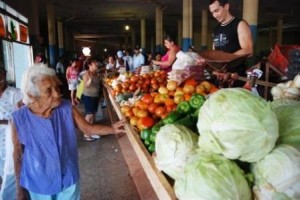 A truck driver who refused to identify himself, transports these fruits from the rural village of San Antonio in Mayabeque Province, to 114th Street in Marianao, where almost all the vendors of agricultural products get their supplies, said, “The fruits can’t be transported ripe because they get crushed and the measured or exact use of flordimed is not harmful, it facilitates the sale and has always been used.”
A truck driver who refused to identify himself, transports these fruits from the rural village of San Antonio in Mayabeque Province, to 114th Street in Marianao, where almost all the vendors of agricultural products get their supplies, said, “The fruits can’t be transported ripe because they get crushed and the measured or exact use of flordimed is not harmful, it facilitates the sale and has always been used.”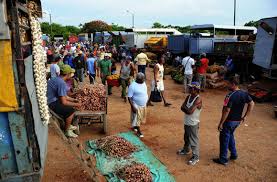 Beyond this, the problem lies in the lack of reviews of some irresponsible sellers who, eager to sell, sprayed the precious products with chemicals. This nebulous situation is annoying both the serious sellers, as is the case of Castillo, who have nothing to do with this, and who are now unable to sell their most popular products — papayas and bananas — as well as consumers who like these precious fruits and have to look for them in far off places.
Beyond this, the problem lies in the lack of reviews of some irresponsible sellers who, eager to sell, sprayed the precious products with chemicals. This nebulous situation is annoying both the serious sellers, as is the case of Castillo, who have nothing to do with this, and who are now unable to sell their most popular products — papayas and bananas — as well as consumers who like these precious fruits and have to look for them in far off places.
